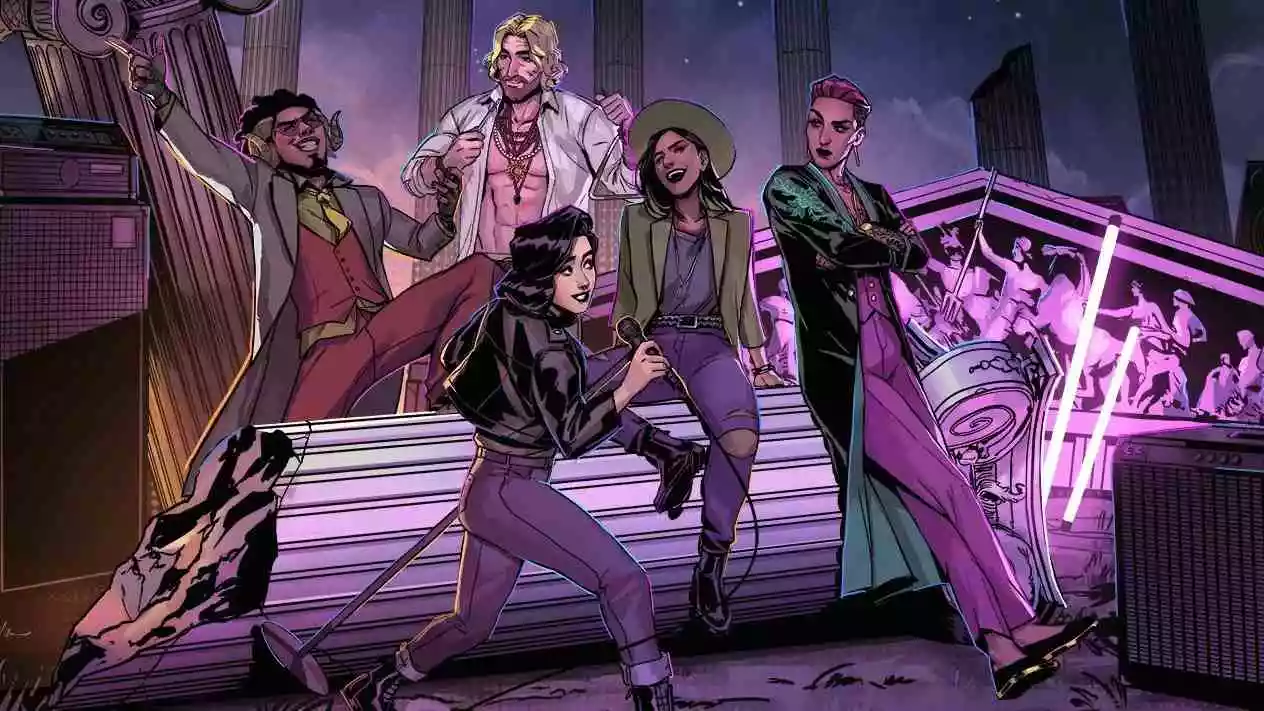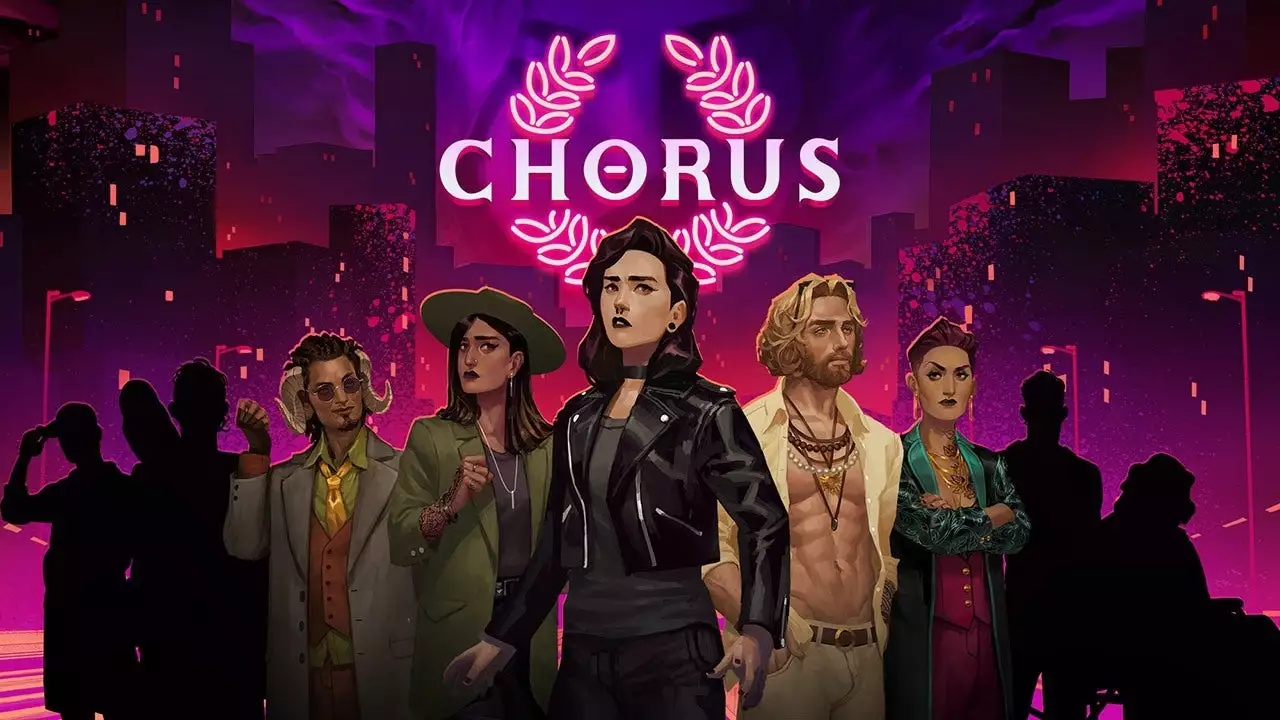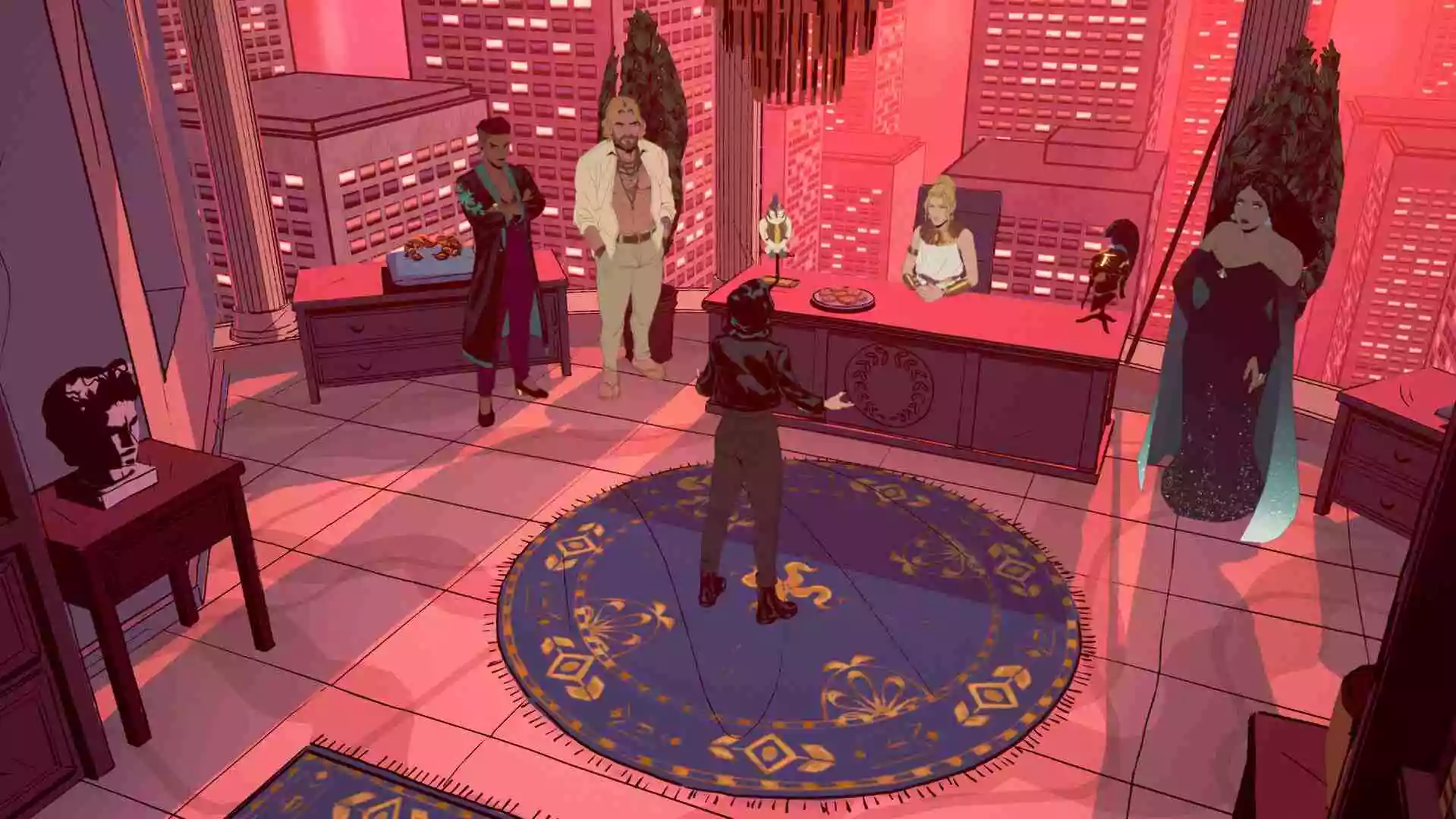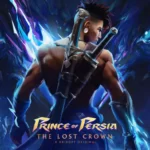Stray Gods The Roleplaying Musical immediately stands out with its extraordinary fusion of genres – a supernatural murder mystery visual novel musical. It’s a concept that’s as unique as it is audacious, capturing attention and igniting hopes that such imaginative ideas will become more prevalent in the gaming world due to its boldness.

One of the game’s most enchanting moments occurs when characters, both mortal and gods from Greek mythology, spontaneously burst into song. During these magical musical interludes, players can select their response, influencing their character’s emotions, shaping the reactions of others, and even altering the song’s lyrics. This innovative approach adds an entirely new layer to the concept of choice in gaming, particularly during musical battles where players dictate who sings and how emotions are conveyed through the song.
However, as the game progresses, the initial thrill of these choices may start to fade, and the predictability of the story and characters can lead to a slightly underwhelming experience. Nonetheless, Stray Gods continues to captivate players through its exceptional artwork and outstanding voice acting.
Centered around the protagonist Grace, voiced by the talented Laura Bailey of The Last of Us fame, the game follows her journey as a college dropout who finds herself unjustly accused of the murder of a muse of the gods. The voice acting is consistently top-notch, featuring recognized talents such as Troy Baker, Merle Dandridge, Ashley Johnson, Felicia Day, Rahul Kohli, and Anthony Rapp. This extensive cast ensures that each character’s lines are richly voiced, enhancing the game’s musical and narrative elements.
Ultimately, Stray Gods The Roleplaying Musical presents a captivating and inventive experience that brilliantly blends genres. While the novelty of its choices may wane over time and the story’s predictability might hold it back, the game’s splendid art and exceptional voice acting contribute to an overall engaging and entertaining adventure.
Mythical Characters in Stray Gods The Roleplaying Musical
Within the realm of its fantastical narrative, Stray Gods endeavors to introduce players to the timeless and intricate world of Greek mythology. While this undertaking is captivating, there’s a sense of mild disappointment when it comes to the portrayal of the characters. The narrative potential of exploring iconic figures like Athena, Pan, and Persephone isn’t fully realized, leaving a yearning for deeper insights and fresh perspectives on these legendary gods and their well-established stories.

The allure of delving into Greek mythology lies in the prospect of unearthing unexplored facets of these characters, unveiling hidden layers that reinvigorate their narratives. While Stray Gods does offer occasional surprises—Apollo’s brooding and unconventional backstory stands out—the majority of the pantheon remains tethered to their archetypal representations, offering a rather secure interpretation of these figures.
The relatively brief playtime of Stray Gods—spanning around three hours—compounds this issue. The narrative pace necessitates plot acceleration, occasionally at the expense of fully fleshed-out character development. Although the writing, led by BioWare veteran David Gaider, carries a certain level of expertise, it occasionally leans towards prioritizing the advancement of the story over the depth of the characters.
Interaction with the pantheon unfolds through brief encounters, often taking place at a bar or party, where snippets of dialogue allow players a fleeting glimpse into the lives of these gods. However, the overarching objective invariably remains focused on identifying the murder suspect and clearing your own name, resulting in minimal room for comprehensive character exploration.
Several dialogue choices do provide the opportunity to learn more about the characters, but these moments are often optional, allowing players to bypass them while pursuing the primary questline. This selective interaction contributes to a sense of yearning for a more immersive exploration of the pantheon’s lives and personalities, elevating the game beyond its plot-driven progression.
Stray Gods Visual Masterpiece: Artistic Brilliance and Dynamic Choices
The visual artistry in Stray Gods stands as an undeniable triumph. The hand-drawn characters emerge with an unmistakable vibrancy, their distinctive appearances highlighted by bold lines and unique fashion choices. A touch of edgy piercings and accessories grants the gods an additional layer of personality that harmonizes seamlessly with their written profiles and voice acting. The backdrops, whether depicting a lair or a luxurious apartment, boast captivating color palettes that are nothing short of a visual treat.

While the artistry undoubtedly excels, a minor quirk in the form of non-moving lips caught my attention. Although a common trait in visual novels, Stray Gods takes an innovative approach by incorporating musical elements into the narrative. This divergence occasionally results in a curious contrast, where characters maintain closed lips while their voices fill the musical scenes. Nevertheless, the incorporation of diverse camera angles effectively maintains the narrative’s fluidity and immersive quality.
ALSO READ: F1 Manager 2023 Review: An Immersive and Thrilling Racing Experience
The central murder mystery plot may occasionally falter in its predictability, with the true culprit becoming apparent early on and remaining unchanged. However, Stray Gods compensates with an element of replayability through dynamic dialogue choices. Grace’s responses pivot based on whether players opt to portray her as Clever, Charismatic, or Kickass. This decision significantly influences how scenes unfold, presenting an opportunity to engage with the narrative in distinct and multifaceted ways. The contrast between an assertive, “Kickass” Grace and a logical, “Clever” Grace adds depth to character interactions, enhancing the overall replay value.
Seamless Gameplay and Diverse Choices in Stray Gods: Where Every Decision Shapes Your Journey
Jump on a captivating journey that unfolds like an interactive TV special, offering gameplay so effortlessly engaging, it draws you in like a familiar story. Stray Gods, with its intuitive mechanics, takes you on a unique adventure that’s akin to exploring intriguing places for hidden clues, while your decisions shape the path ahead, much like a choose-your-own-adventure tale.

In this enchanting world, you’ll find yourself immersed in a tapestry of choices. Navigate through encounters with other characters or overcome obstacles using a range of strategies, from charming conversations to cunning interrogations or even discreetly sneaking past challenges. The power of choice is yours; violence is an option, but subtlety can be equally potent. As you step into the shoes of Grace, the protagonist, the dialogue choices you select become your voice, steering the narrative in your chosen direction.
The heart-pounding moments of song battles intensify the experience, where timing becomes a crucial element. However, even in these high-pressure situations, there’s a comfort to be found – the game graciously steps in to make a choice if you falter, ensuring that your journey remains riveting without overwhelming consequences.
ALSO READ: Arcadian Atlas Review – A Captivating SRPG Adventure with Love, War, and Unique Combat Systems
But the allure doesn’t end there. Stray Gods invites you to replay and uncover the countless possibilities that lie within its world. Venture into the realm of romantic entanglements, pursuing relationships with a diverse cast of characters. In a refreshing move, gender boundaries are no obstacle, granting you the freedom to pursue connections without restrictions. The game’s inclusivity is a testament to its commitment to providing an enjoyable experience for all players.
Technical hiccups are few and far between, with the occasional hiccup in saving progress being the sole hiccup. These minor bumps in the road don’t overshadow the immersive adventure that awaits, making Stray Gods accessible even to those who have never ventured into the realm of video games before. A testament to its seamless design, anyone, regardless of their gaming background, can dive into the captivating world of Stray Gods and find themselves spellbound by its charm.
Musical Emotions and Emotional Depth in Stray Gods: A Theatrical Symphony of Characters
Prepare to be swept away by the soul-stirring melodies of Stray Gods, where original compositions seamlessly merge with the narrative, akin to songs that could grace the stage of a Broadway production. Guided by the skilled hands of renowned game composer Austin Wintory, these compositions aren’t mere background noise; they are immersive journeys that unravel the intricate layers of the characters’ souls.
The expansive nature of these musical pieces allows for an unfiltered exploration of the characters’ innermost thoughts. Each composition serves as a window into their contemplations on mortality, reflections on the weight of their past, and the raw venting of their emotions. The talented voice actors, with their astonishing range, elevate the experience further by delivering performances that tug at heartstrings. The weightiness of the content occasionally evokes a sense of empathy, triggering reflections on the emotions of loved ones nearing the end of their own journeys.
Though lacking the instant catchiness of pop hooks, these compositions reveal their brilliance upon closer inspection. A second playthrough reveals recurring themes and character accents, showcasing the intricacies woven into the game’s fabric. The songs boast moments of sheer brilliance, ranging from Grace’s sudden shift into a Hamilton-esque delivery during a rap battle, where she hurls witty insults at her adversaries, to the whimsical rendition of “I Put a Spell on You.” Notably, a villain’s soliloquy drips with the appropriate devilishness, further cementing the immersive experience.
Grace’s poignant declaration, “It sounds like they hurt you, defied or usurped you,” encapsulates the overarching sentiment of the music. The deities populating this world have endured centuries of grievance and injustice, a notion that resonates profoundly. Grace, our protagonist, seemingly becomes a therapist for these wounded gods, offering solace and comfort in an attempt to mend their broken spirits. This approach, while shedding light on the characters’ depths, may not resonate with everyone, as it delves into melancholic territories.
Video games often offer a form of escape from the rigors of reality, and herein lies the dichotomy. Stray Gods, with its unflinching exploration of somber emotions, might, for some, overshadow the escapism that draws many to the medium. Its persistent engagement with melancholy themes could cast a shadow over prolonged gameplay, rendering the experience a touch bleak. As players spend hours immersed in this world, a balancing act emerges between the allure of its emotional depth and the need for a lighter touch to maintain the joy of escapism.
Consequences in Stray Gods: Shaping Fate Through Harmonious Decisions
Upon my initial venture into the world of Stray Gods, I embarked on a leisurely journey, savoring each dialogue line in its entirety. Yet, I encountered moments when the story’s tempo seemed to languish, particularly in the midst of slower songs that delve into characters’ introspections, like Apollo’s contemplation of his passivity. These moments, although unavoidable, bestow depth upon the narrative. Thankfully, the game provides respite in the form of an option within the menus, allowing for dialogue to be skipped during subsequent playthroughs, ensuring a smoother experience.

The allure of Stray Gods beckons for multiple journeys, as your choices weave a tapestry of life-and-death outcomes at pivotal junctures. Beyond these major forks, the minutiae of your decisions cascade into the fabric of the narrative. Even the lyrics of the songs can be influenced, offering a canvas for creative exploration. You’re granted the privilege of determining who commands the stage alone, who engages in duets, and who partakes in harmonious ensembles. More intriguingly, you can shape Grace’s persona, toggling between spotlight-hogging tendencies and a more generous disposition.
ALSO READ: Pikmin 4 Review – An Exceptional Video Game Experience for All Ages and the Entire Family
This dynamic engagement with the storyline becomes even more pronounced with Grace’s muse ability. Her melodic influence on those around her extends beyond mere music, impacting their mental states and life choices. A fascinating ethical question emerges: does this influence compromise their autonomy? This inquiry, intriguingly examined in games like Life is Strange: True Colors, garners only a surface-level exploration in Stray Gods. While the game raises the issue, it doesn’t linger on the potential ramifications, choosing instead to let Grace wield her powers without delving into the aftermath.
Verdict
Stray Gods The Roleplaying Musical is a murder mystery that takes you on an exciting journey. The game’s creators love musical theater, and it shows in the cool visuals, changing songs, and strong emotions of the characters. While the story is sometimes familiar, making you want to play less often, the game still impresses with its creativity. It mixes mythical gods with human struggles, making a fun and emotional experience. If you like music and mysteries, “Stray Gods” is worth trying!
FAQs
What is Stray Gods The Roleplaying Musical about?
Stray Gods is a unique video game that combines elements of a supernatural murder mystery, visual novel, and musical. Set in a world where mortals and Greek gods coexist, players take on the role of Grace, a college dropout falsely accused of murdering a muse. The game involves solving the murder mystery, interacting with gods and characters from Greek mythology, and making choices that impact the story and music.
What makes Stray Gods unique?
Stray Gods stands out for its combination of genres, blending supernatural elements, murder mystery, visual novel storytelling, and musical elements. Players get to experience moments where characters burst into song, and the player’s responses affect character interactions, emotions, and even the lyrics of the songs. The game also features recognizable voice actors, including Laura Bailey, Troy Baker, Felicia Day, and more.
How do the musical elements work in the game?
In Stray Gods, characters, including mortals and Greek gods, engage in musical moments where players can choose responses. These choices impact the character’s emotions, interactions, and even alter the lyrics of the songs. Musical battles also occur, allowing players to decide who sings and how emotions are expressed. The game’s original songs, composed by Austin Wintory, contribute to character development and storytelling.
Who is the protagonist, and who are some notable voice actors?
Players assume the role of Grace, voiced by Laura Bailey. She is a college dropout accused of murder. The game features a talented voice cast, including Laura Bailey, Troy Baker, Merle Dandridge, Ashley Johnson, Felicia Day, Rahul Kohli, and Anthony Rapp.
How is the character development in Stray Gods?
The game’s character development is somewhat limited due to its relatively short playtime (around three hours). While players can briefly interact with characters and make choices, the focus is mainly on advancing the plot and solving the murder mystery. Dialogue choices impact character interactions, and playing as Clever, Charismatic, or Kickass Grace leads to different outcomes.
What is the visual and artistic quality of the game?
Stray Gods boasts fantastic hand-drawn artwork with distinctive characters and vibrant backgrounds. The gods’ designs include unique accessories that match their personalities. However, it’s worth noting that the characters’ lips do not move during songs, which can occasionally break immersion. The art style creates an engaging and visually appealing experience.
Is replayability a feature of Stray Gods?
Yes, the game offers replayability through different dialogue choices and character interactions. Players can replay the game to experience alternative outcomes, explore relationships with other characters (regardless of gender), and see the impact of their choices on the story and music.
How does the musical aspect affect gameplay?
The musical elements in Stray Gods are integrated into the gameplay through dialogue choices and song battles. Players can choose responses that affect characters’ emotions and interactions during musical moments. Song battles involve timed choices, but failing to make a choice does not result in severe consequences, as the game selects a choice for the player.
How does Stray Gods handle the themes of mortality and emotions?
The game’s original songs, composed by Austin Wintory, delve into themes of mortality, bitterness, and emotions experienced by the gods and characters. Voice actors deliver heartfelt performances that contribute to the emotional depth of the game. However, some players might find the heavy themes a bit bleak, as the game dwells on sad emotions.
What is the overall verdict of Stray Gods The Roleplaying Musical?
Stray Gods offers a unique blend of genres, combining a supernatural murder mystery, visual novel, and musical elements. While the game has strong points, such as its original songs, distinctive artwork, and voice acting, it falls somewhat short in character development and story predictability. The limited playtime contributes to sacrificing character development for plot advancement. Despite its flaws, the game remains worth playing for its creative concept and interactive musical experience.






